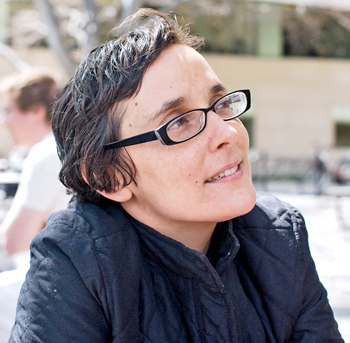A chance encounter with a programmer in college sent anthropologist Gabriella Coleman’s career in an unexpected direction.

As a grad student in anthropology, Gabriella Coleman was warned that studying the culture of computer hackers would make it hard to get a job teaching in a university. She went ahead anyway, becoming one of the first academics to explore the meaning and implications of the open source movement in software. Coleman now holds an endowed chair in scientific and technological literacy at McGill University in Montreal, and is currently researching the digital activism of the hacker collective Anonymous for a new book. Here, she discusses why software wants to be free, why hacker culture matters for the rest of us, and whether traditional academic disciplines are still relevant.
FAST COMPANY: You have degrees in religion and anthropology--how did you get gravitate to hacking and digital activism?
 GABRIELLA COLEMAN: I was in the anthropology program at University of Chicago. I meant to major in anthropology as an undergrad as well, but at the time, the anthropology department at Columbia was in disarray, so I had decided to do religion. In college, I’ll never forget when this programmer who lived on my floor got a software CD of the Linux operating system in the mail. He was so excited, and I was dumbfounded. The thing is, when Linux was first being developed, in the early 1990s, you had to download it from the Internet, probably with a dial-up connection. It took days to download and burn to floppies. Ordering a CD and plopping it into your system was huge time savings.
GABRIELLA COLEMAN: I was in the anthropology program at University of Chicago. I meant to major in anthropology as an undergrad as well, but at the time, the anthropology department at Columbia was in disarray, so I had decided to do religion. In college, I’ll never forget when this programmer who lived on my floor got a software CD of the Linux operating system in the mail. He was so excited, and I was dumbfounded. The thing is, when Linux was first being developed, in the early 1990s, you had to download it from the Internet, probably with a dial-up connection. It took days to download and burn to floppies. Ordering a CD and plopping it into your system was huge time savings.
And then the programmer told me about copyleft, which refers to a class of free software licenses, such as the GNU General Public License. It’s built on copyright, but with an additional provision that basically disables the copyright so that software has a way of replicating itself. At the time, I was interested in patents in medicine and was following activists protesting patents on AIDS drugs. When I learned about copyleft, I was hooked. While there are some traditions that have managed to confound intellectual property law--like folk music and rap--what fascinated me about the open source movement, which at the time was only called free software, was that these people had created an alternate, parallel legal system.
No one in anthropology was getting close to this. My advisers knew it was super-interesting, but because it wasn’t focused on a particular area of the world, they warned me I was going to have trouble getting a job in an anthropology department. But I was totally passionate about it.
What are hacker ethics and why has this been such an influential model?
Open source wasn’t the sole phenomenon that helped bring about a shift in consciousness over things like intellectual property law. The pervasiveness of downloading music and sharing did that as well. The difference for why open source became a beacon of inspiration was that there was a coherent ethical philosophy that went along with the practice. There’s a belief there should be some limits on what should property--things like software, or water. And with software in particular it often makes sense to keep it open for the sake of innovation. But what made the open-source movement so influential is that it never got stuck with any traditional political associations. That’s especially significant in the United States, where it’s easy to disable politics once they’re labeled leftist or rightist. Developers are actually quite diverse in their political commitments, and the reluctance to code the philosophy in this political language has allowed it to be adopted by many actors. In terms of the practice, the proof was in pudding. It’s hard to argue against hundreds of thousands of people creating open-source projects like Debian--the largest free software project in the world, which has more than a thousand developers working on it free.
Is open-source ethos having an impact in other areas? What about medicine, like the AIDS drugs you mentioned?
I’m still following that, and there are some interesting developments in Brazil, with more limited patents for life-saving drugs. There is also a kind of nonprofit in Berkeley that started developing drugs for diseases that strike a lot of people in the developing world but aren’t being developed because it’s not so profitable for the pharmaceutical companies. Another sort of nascent area is open-source biology, which is making biological research cheaper and cheaper. This is something to really look out for.
How does training in anthropology help you to approach a subject like this?
It’s interesting to think about what different disciplines bring to the table. I’ve been thinking a lot about the difference between journalism and anthropology lately because I deal with a lot of journalists. Journalism tends to focus on characters and individuals. Anthropology often does the opposite. Anthropologists try to understand things holistically. But since it is impossible to represent all levels of complexity, I usually narrow down the focus to my personal interests, such as ethics and politics.
Now you’re writing a book on Anonymous, the geek and hacker activist collective. How did you get interested in that?
I stumbled onto it so accidentally. I spent a year at the University of Alberta, which has the largest Scientology archives in the world. I started looking at the 1990s protest that grew out of Usenet, where hackers and netizens were protesting Scientology. The Church of Scientology claimed copyright over sacred church scriptures and there were battles over trademark. Once Scientology started going after people, it became a perfect target for hackers because it represented the complete opposite of what geeks and hackers value--it’s a super-proprietary, secret system that uses pseudo-scientific language and is enthralled with fake technology. When in 2008, something called Anonymous arose--at first to troll the church--that was fascinating to me. It went from a bunch of trolls pranking the church to a protest movement that I watched in real time. It got more and more surprising as Anonymous went from a niche focused on Scientology to grow different nodes to intervene in diverse issues. There was an element of political awakening--geeks treat the Internet as a kind of homeland and will rise up and use both their technical chops and traditional activist skills to mobilize and protect it.
Speaking of political awakening, how does your research help you understand the role of technology in the context of something like the Arab Spring?
When it comes to massive protests like those in Egypt, and so many others in the last hundreds of years, there is always a convergence of factors that help something come into being--sometimes the spark is an unanticipated event that has a domino effect. But what is so interesting to me is the global simultaneous co-witnessing of an event, which is kind of recent in human history. People say the explosion of Krakatoa was the first global media event--the telegraph was used to report it and within days there was a global outpouring. Something like Twitter is part of that history, but it happens much more quickly and you have a record of what people actually think at the time. Now we have a global conversation unfolding before our eyes. I think when people are on the ground protesting, they’re emboldened by knowing there are supporters out there, and it helps them continue on in the struggle.
Is hacker culture now an acceptable subject for an anthropology major? It seems that traditional academic divisions are really in flux. Are they still meaningful?
Well, next year I’m teaching a large class on science and technological controversies for a joint program in arts and science, and I’m also doing my bread-and-butter class on hacker culture and politics. I hope we don’t totally give up on the disciplines, because the complexity of some phenomena requires bringing certain tools to the table. But it’s extremely urgent and important to build bridges between the disciplines and build new trans-disciplinary spaces. I’m not much of a number cruncher, but I am thrilled others are. To have professionals trained in quantitative methods is extremely important--it allows me to see things I can’t with my training. Digital tools can facilitate some cross-disciplinary exchange. Digital humanities is one new field that’s come up quite forcefully--and the English department, of all places, has been a key instigator of this field, looking at new genres of text, new ways of telling stories and gathering and seeing data. There are real limits to just staying in your particular room. If we are able to open up our rooms--or all just gather in the living room--very powerful things can come out.
You will soon be the author of two books. That seems like a pretty old-school way of getting information out.
Well, sort of. It’s important being able to get stuff out there quickly. Digital media has allowed that and I think more academics should do it. But more than ever, we also need the book because in context of being able to write whatever--which has real virtues--but you still need to have one place where you have the whole story, where you’re really thinking about an issue. The two kinds of communication really complement each other.
[Image: Flickr user Peter Dahlgren, Headshot Image: Fred Benenson]